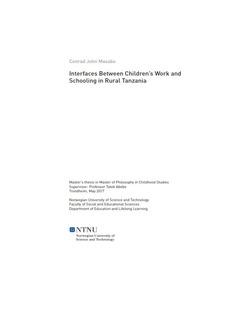| dc.description.abstract | This thesis explores various perspectives on children combining work and schooling in Tanzania. The research was conducted in Buhigwe district, Kigoma region in Tanzania. It was informed by the social constructionist approach, political economy analysis and the structure-agency framework. A qualitative case study design was used in which a total of 29 participants were selected using purposeful sampling. A total of 13 semi-structured interviews, 2 focused group discussions (FGD), 10 recall forms and 16 open-ended-questionnaires were administered to governmental officials, children who combine work and school, their parents or guardians and teachers. In addition, an extensive review of secondary data was carried out. The data was then analysed qualitatively by means of content analysis and hermeneutics in which the main findings were presented in various themes. The study findings reveal that although schooling remains a key component in defining who a child is and poverty remains a key factor for children‘s combining work and school, the need to accrue the promises of formal schooling and lack of parental or guardian support to finance the indirect school costs are the major driving forces for children to combine work and schooling. Children‘s combination of work and school is adopted as the most pragmatic approach to overcome the economic constraints of family or household survival mechanisms. Yet context specificity is very important to understand the practice of children combining work and schooling. The study makes four conclusions: first, although children do work and contribute to families‘ income and economies, there is a minimal appreciation of the children‘s rights to work and implementation of child employment in the regulation guidelines. Second, the motives behind schoolchildren‘s involvement in work is beyond the commonly referred to factor of poverty. Third, combining work and school among schoolchildren is not a Tanzanian phenomenon, but rather an experience common also among school children in other parts of the world. Finally, the study concludes that there is little in terms of supporting children‘s survival initiatives and mechanisms. The study recommends that the government should seek the best ways to implement children‘s rights to light work and employment as provided in the law. In addition, educational reforms that will recognise the rights of children to engage in work are required. While being critical of the notion of workfree childhood, the study suggests the re-introduction and mainstreaming of self-reliance in the school curriculum to give chances for children and preparation for future life. | nb_NO |
